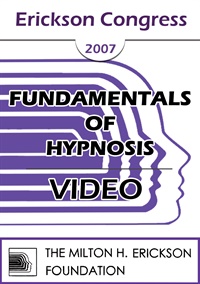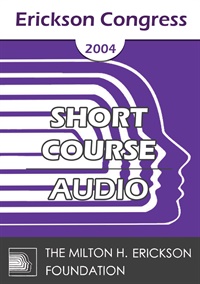
- Average Rating:
- Not yet rated
- Topic Areas:
- Short Courses | Multicultural | Psychotherapy | Meditation, Spirituality and Yoga | Pain and Healing | Belief Systems
- Categories:
- Erickson Congress | Erickson Congress 2004
- Faculty:
- Jeanne Hernandez
- Duration:
- 1:19:41
- Format:
- Audio Only
- Original Program Date:
- Dec 02, 2004
- Short Description:
- This workshop explores how the Native American belief system contains ingredients to keep the mind and body in harmony and promote well-being. We'll explore adding into therapy sessions totem strengths, shaman journeys, medicine wheels, time-frames, respect and gratitude; the circle of life and symbols as reminders of the "right path."
- Price:
- $15.00 - Base Price
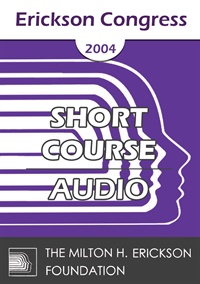
- Average Rating:
- Not yet rated
- Topic Areas:
- Short Courses | Mind-Body | Cognitive Behavior Therapy (CBT) | Ericksonian Hypnosis and Therapy Techniques | Psychotherapy
- Categories:
- Erickson Congress | Erickson Congress 2004
- Faculty:
- Bruce Gregory, PhD
- Duration:
- 1:19:45
- Format:
- Audio Only
- Original Program Date:
- Dec 02, 2004
- Short Description:
- Over the past 20 years Dr. Rossi has innovatively expanded Ericksonian work by demonstrating its connections to microbiology, chemistry, physics, chaos theory and mathematics. This course will explore the relationship and relevance of Dr. Rossi's mind- body work to other forms of psychotherapy. We will learn how mind-body work utilizes and integrates many of the core processes used in the work of Winnecott, Klein, Jung, Gestalt, Masterson, Kohut and cognitive-behavioral therapy.
- Price:
- $15.00 - Base Price
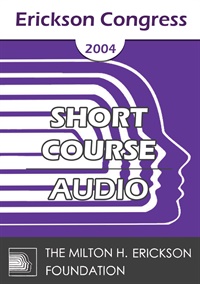
- Average Rating:
- Not yet rated
- Topic Areas:
- Short Courses | Psychotherapy | Brief Therapy | Therapist Development
- Categories:
- Erickson Congress | Erickson Congress 2004
- Faculty:
- Chris Gunn, PhD
- Duration:
- 1:19:37
- Format:
- Audio Only
- Original Program Date:
- Dec 02, 2004
- Short Description:
- "Paradox" is a frequently used term, but less frequently understood and effectively used in brief therapy. This dynamic and light-hearted presentation will borrow Weber's widely accepted construct of Just Noticeable Difference to make the case for Erickson's "tipping the first domino" with pattern analysis and paradoxical intervention. This approach to psychotherapy will be demonstrated and discussed using case examples from the presenter and the participants.
- Price:
- $15.00 - Base Price

- Average Rating:
- Not yet rated
- Topic Areas:
- Short Courses | Psychology | Psychotherapy | Belief Systems | Brief Therapy | Social Issues | Ericksonian Hypnosis and Therapy Techniques | Multicultural
- Categories:
- Erickson Congress | Erickson Congress 2004
- Faculty:
- Naji Abi-Hashem, PhD
- Duration:
- 1:19:45
- Format:
- Audio Only
- Original Program Date:
- Dec 02, 2004
- Short Description:
- What are the causes of fundamentalism and militant behavior? Can we clearly understand or define terrorism? This presentation will examine the root causes of radicalism and religious militancy and will explore how Milton Erickson would have dealt with these emerging and recent phenomena. We will attempt to address these sensitive, timely matters through open discussion among participants and analyze the psychosocial nature of terrorism and its impact on people.
- Price:
- $15.00 - Base Price
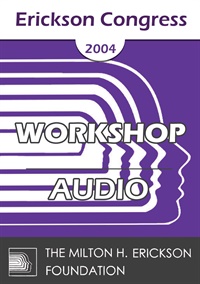
- Average Rating:
- Not yet rated
- Topic Areas:
- Workshops | Psychotherapy | Solution Oriented Approach | Language of Hypnosis
- Categories:
- Erickson Congress | Erickson Congress 2004
- Faculty:
- Steve De Shazer, MSSW | Yvonne Dolan, MA
- Duration:
- 1:58:30
- Format:
- Audio Only
- Original Program Date:
- Dec 02, 2004
- Short Description:
- This workshop will demonstrate through lecture, videotapes case examples and practice exercises how a working knowledge of "language games" can allow therapists to appropriately, respectfully and effectively address emotions in the context of psychotherapy and conversely, how misuse of language could potentially lead to a variety of negative consequences including client disenfranchisement, disempowerment, reification of problems and iatrogenic symptoms.
- Price:
- $15.00 - Base Price

- Average Rating:
- Not yet rated
- Topic Areas:
- Workshops | Psychotherapy
- Categories:
- Erickson Congress | Erickson Congress 2004
- Faculty:
- Brent Geary, PhD
- Duration:
- 2:10:24
- Format:
- Audio Only
- Original Program Date:
- Dec 04, 2004
- Short Description:
- Means of motivating patients are crucial in effective psychotherapy. This workshop will explore methods for discerning motivational variables that can enhance the delivery of both hypnotic and non-hypnotic therapies.
- Price:
- $15.00 - Base Price
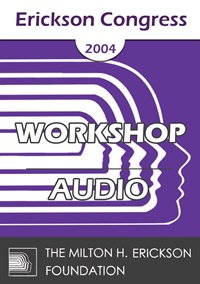
- Average Rating:
- Not yet rated
- Topic Areas:
- Workshops | Psychotherapy | Language of Hypnosis
- Categories:
- Erickson Congress | Erickson Congress 2004
- Faculty:
- Richard Fisch, MD
- Duration:
- 2:27:24
- Format:
- Audio Only
- Original Program Date:
- Dec 05, 2004
- Short Description:
- Therapy is, inherently, a means of influencing a client, mostly verbally. This workshop will illustrate guidelines for making language more precise and effective in order to enhance the therapist's and client's goal of the therapy. Guidelines will be explained didactically, in a composite videotape of a clinical case and in dialogue with participants.
- Price:
- $15.00 - Base Price
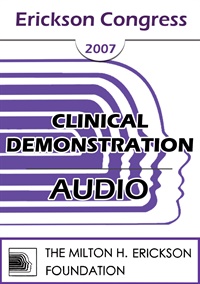
- Average Rating:
- Not yet rated
- Topic Areas:
- Clinical Demonstrations | Psychotherapy
- Categories:
- Erickson Congress | Erickson Congress 2007
- Faculty:
- Stephen Gilligan, PhD
- Duration:
- 53:54
- Format:
- Audio Only
- Original Program Date:
- Dec 08, 2007
- Short Description:
- IC07 Clinical Demonstration 02 - Connecting with the Inner Self in Psychotherapy - Stephen Gilligan, Ph.D.
- Price:
- $15.00 - Base Price
- Average Rating:
- Not yet rated
- Topic Areas:
- Fundamentals of Hypnosis | Hypnosis | Psychotherapy
- Categories:
- Erickson Congress | Erickson Congress 2007
- Faculty:
- Ernest Rossi, PhD
- Course Levels:
- Master Degree or Higher in Health-Related Field
- Duration:
- 2:02:19
- Format:
- Audio and Video
- Original Program Date:
- Dec 09, 2007
- Short Description:
- The four-stage creative process will be facilitated with bioinformatics approaches to therapeutic hypnosis with the entire audience. Adaptations to each individual's needs will be demonstrated with volunteers from the audience.
- Price:
-
Sale is $29.00
price reduced from Base Price - $59.00
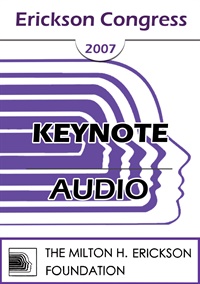
- Average Rating:
- Not yet rated
- Topic Areas:
- Keynotes | Neuroscience | Psychotherapy | Art and Creativity | Naturalistic | Utilization
- Categories:
- Erickson Congress | Erickson Congress 2007
- Faculty:
- Ernest Rossi, PhD
- Duration:
- 55:13
- Format:
- Audio Only
- Original Program Date:
- Dec 08, 2007
- Short Description:
- The Bioinformatics of Enchanting Effectiveness is the scientific foundation of Milton H. Erickson's naturalistic and utilization approach to therapeutic hypnosis and psychotherapy via the psychosocial facilitation of gene expression and brain plasticity.
- Price:
- $15.00 - Base Price
Please wait ...


